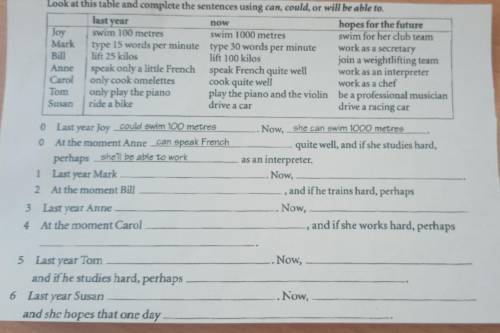Look at table and complete the sentences using can, could, or will be able to

Другие вопросы по теме Английский язык
Популярные вопросы
- Вырази в километр ах и в метрах 5078 м, 6787м....
1 - Вычислите удобным сумму: а)99+64; в)46+197; б)198+55; г)34+299....
2 - Подарить это совершенный вид или несовершенный вид...
2 - Сберегательный банк предоставляет клиентам кредиты под 19,8...
3 - Составь и напиши предложения с глаголами купил,объяснил,ушел...
1 - Переведите на . она удивилась ,когда поняла, что анна законсервировала...
2 - Определи падеж существительных в словосочетаниях. готовились...
2 - 1. спишите словосочетания, вставьте буквы, графически обозначьте...
2 - Игорь,играть,игра,игрушка,игрушечный,игровой.какое слово здесь...
1 - Противоположные слова день,враг,хвалить,тепло,смелый....
1
1. Tom is 24 years old. He ___ drive a car.
We can see from the table that the age of getting a driver's license is 18, so Tom, being 24 years old, is already capable of driving a car. Therefore, we should use "can" in this sentence:
"Tom is 24 years old. He can drive a car."
2. Sophie is 9 years old. She ___ swim.
Looking at the table, we can see that the minimum age for swimming lessons is 5. Since Sophie is 9 years old, she is already capable of swimming. Therefore, we should use "can" in this sentence:
"Sophie is 9 years old. She can swim."
3. Tim is 15 years old. He ___ speak French.
From the table, we can see that students start learning French at the age of 12. Since Tim is 15 years old, he should have already acquired some knowledge of the language by now. Therefore, we should use "can" in this sentence:
"Tim is 15 years old. He can speak French."
4. Kate is 6 years old. She ___ ride a bicycle.
According to the table, children start learning to ride a bicycle at the age of 4. Kate is 6 years old, so she should already have the ability to ride a bicycle. We should use "can" in this sentence:
"Kate is 6 years old. She can ride a bicycle."
5. David is 14 years old. He ___ play the piano.
Looking at the table, we can see that children start learning to play the piano at the age of 8. David is 14 years old, so he should have had enough time to develop his piano skills. Therefore, we should use "can" in this sentence:
"David is 14 years old. He can play the piano."
Remember, "can" is used to express ability or capability in the present, while "could" is used to express past ability. "Will be able to" is used to express future ability. In this exercise, we only need to use "can" since we are talking about the current abilities based on the age given in the table.